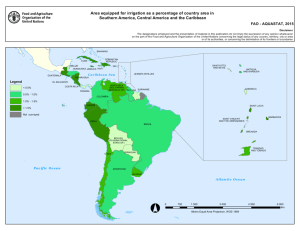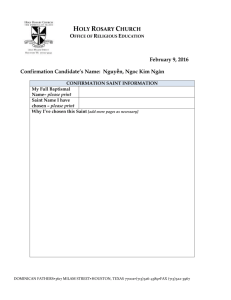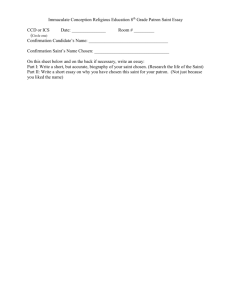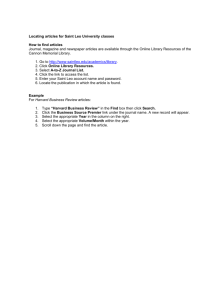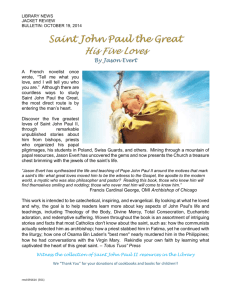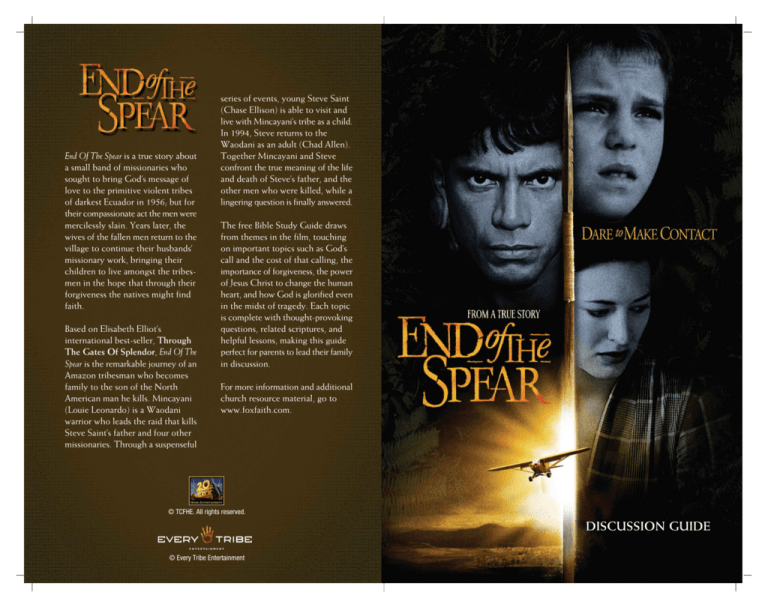
End Of The Spear is a true story about
a small band of missionaries who
sought to bring God’s message of
love to the primitive violent tribes
of darkest Ecuador in 1956; but for
their compassionate act the men were
mercilessly slain. Years later, the
wives of the fallen men return to the
village to continue their husbands’
missionary work, bringing their
children to live amongst the tribesmen in the hope that through their
forgiveness the natives might find
faith.
Based on Elisabeth Elliot’s
international best-seller, Through
The Gates Of Splendor, End Of The
Spear is the remarkable journey of an
Amazon tribesman who becomes
family to the son of the North
American man he kills. Mincayani
(Louie Leonardo) is a Waodani
warrior who leads the raid that kills
Steve Saint’s father and four other
missionaries. Through a suspenseful
series of events, young Steve Saint
(Chase Ellison) is able to visit and
live with Mincayani’s tribe as a child.
In 1994, Steve returns to the
Waodani as an adult (Chad Allen).
Together Mincayani and Steve
confront the true meaning of the life
and death of Steve’s father, and the
other men who were killed, while a
lingering question is finally answered.
The free Bible Study Guide draws
from themes in the film, touching
on important topics such as God’s
call and the cost of that calling, the
importance of forgiveness, the power
of Jesus Christ to change the human
heart, and how God is glorified even
in the midst of tragedy. Each topic
is complete with thought-provoking
questions, related scriptures, and
helpful lessons, making this guide
perfect for parents to lead their family
in discussion.
For more information and additional
church resource material, go to
www.foxfaith.com.
© TCFHE. All rights reserved.
DISCUSSION GUIDE
© Every Tribe Entertainment
ABOU T T H E F I L M
End Of The Spear is a true story about
a small band of missionaries who
sought to bring God’s message of love
to the primitive violent tribes of
darkest Ecuador in 1956; but for their
compassionate act the men were
mercilessly slain. Years later, the wives
of the fallen men return to the village
to continue their husbands’ missionary
work, bringing their children to live
amongst the tribesmen in the hope
that through their forgiveness the
natives might find faith.
Based on Elisabeth Elliot’s international bestseller, Through The Gates
Of Splendor, End Of The Spear is the
remarkable journey of an Amazon
tribesman who becomes adopted as
family to the son of the North
American man he kills. Mincayani
(Louie Leonardo) is a Waodani warrior
who leads the raid that kills Steve
Saint’s father and four other
missionaries. Through a suspenseful
series of events, young Steve Saint
(Chase Ellison) is able to visit
Mincayani’s tribe as a child. In 1994,
Steve returns to the Waodani as an
adult (Chad Allen). Together,
Mincayani and Steve confront the
true meaning of the life and death of
Steve’s father, and the other men who
were killed, and a lingering question
is finally answered.
1
End Of The Spear is a film for teens and
adults. It provides an opportunity to
discuss how God calls each of us to a
specific purpose that ultimately is part
of a bigger plan – one that God sees
from beginning to end. Understanding
the themes of the film – God’s call
and the cost of that calling, the
importance of forgiveness, the power
of Jesus Christ to change the human
heart, and how God is glorified even
in the midst of tragedy – is the reason
these and other topics are addressed
in the movie and why we’ve created
this Discussion Guide. With this
booklet, you or any other leader can
utilize the messages in End Of The Spear
as a group discussion tool.
The lessons are supplemented with
movie clips you’ve either received or
downloaded online. These clips were
specifically selected to help you set
the tone and furnish the context for
your discussion or Bible study. There
are also suggested scriptures for your
group to study in-depth, and we’ve
provided several discussion provoking
questions based on the different
scenes. This guide is an easy-to-use
way to kick-start interesting discussions within your small group, and
it works without any of your group
having seen the film. However, it is
recommended that you announce your
intentions of using the film clips ahead
of time. For example, the week before
you intend to have a clip-oriented
discussion, you might show the film
trailer (included with the clips) to
your group or congregation and let
them know that you will incorporate
it into your discussion the following
week (or the next time you meet).
This will allow your members the
opportunity to view the film themselves (rent or purchase) if they so
desire.
Discussions:
In an effort to help you reinforce the
themes and messages of End Of The
Spear, we have chosen clips from the
film that you can show to your group.
These clips can be downloaded online
or shown through a specially made
DVD that you can request at the same
website. These DVD clips are followed
up with questions and scripture found
in the Discussion Guide. The questions
should draw your group members into
a conversation about what they have
just seen. It is not necessary to tackle
these topics in a row, or all in one
session. If you would prefer just to
cover one or two, feel free. It is all
up to you.
First of all, introduce the discussion
by saying something like this: “We’re
going to talk about several topics –
God’s call and the cost of that calling,
the importance of forgiveness, the
power of Jesus Christ to change the
human heart, and how God is glorified
even in the midst of tragedy. We have
some scenes from the movie End Of
The Spear that we are going to watch
and then analyze to see what we can
learn from them.”
Next, give a brief overview of the film.
Then, play the clip you have selected.
Once the clip plays, then open the
floor for discussion, using the questions and scriptures that are provided,
or use some of your own. To finish,
you can close each session by giving
the brief “Lesson to Learn” provided
at the end of the topic.
NOTE: Since some of your group
members have likely not seen the
film, it is a good idea to provide
them with the context of the clip
before watching it. This can be found
in the italicized text that precedes
the questions and scripture references
for that particular clip.
Please keep in mind that you do not
have to get through all the clips in
order to have a successful discussion.
Also, you do not need to sacrifice a
good conversation to finish the scenes.
As we mentioned above, discussion
times go best when you allow
2
Questions:
The five missionary men, Jim Elliot,
Ed McCully, Pete Fleming, Roger
Youderian and Nate Saint feel an
urgency to make contact with the
violent Waodani people. Why? Is it
only the current situation that creates
this urgency or is it part of God’s call
to their hearts? Discuss.
freedom, but still provide the framework that will point to lessons in God’s
word.
GOD S CALL
i
First Contact
In the early 1950’s five missionaries
have answered God’s call to serve in
Ecuador. End Of The Spear takes us to
Shell Mera where Nate Saint, his wife
and children, serve at a base camp.
As an experienced bush pilot, Nate
provides supplies to other missionaries
in remote locations. He and four of
these missionary families are particularly intrigued with the Waodani tribe
who is known for their vicious society.
After finally locating the elusive tribe
in the rainforest, Nate Saint and
Jim Elliot plan how to make contact
with the natives from the air. Then,
armed with a few phrases they have
learned from Rachel Saint’s work with
Dayumae, who fled this same tribe
as a child, the missionary men attempt
their first communication with the
natives.
3
Read the scripture Matthew
28:16-20 that is known as the Great
Commission. Discuss what Jesus was
asking of His disciples in this passage.
What is God calling Christians to
do today?
God has a mission or purpose for
all of us. Think about what God has
called you to do in His name. Have
you listened to that inner voice – that
nudge from the Holy Spirit – that can
lead you in the path He desires for
you? Share your thoughts on these
questions.
Lesson to Learn:
God doesn’t always call us to an easy
path. Such was the case of the five
missionaries, Nate Saint, Jim Elliot,
Ed McCully, Pete Fleming, and Roger
Youderian. Not only were they serving
in the South American country of
Ecuador, but they were in very remote
locations, as well. Still, God placed
on their hearts an even more difficult
calling: to reach the Waodani – one
of the most vicious tribes known to
the civilized world.
One may ask why God would
commission these five men to bring
the gospel to these violent natives.
The answer is the same as when he
sent his Son, Jesus to die for us: He
loves the whole world. That’s why He
asks us to share the good news to
those who haven’t heard it before.
In the case of the missionaries, their
calling from God to reach the
Waodani people in faraway Ecuador
was so these natives could know love
instead of hate, peace instead of chaos.
they will ever have. In some instances,
following Jesus can be leading a Bible
study group, teaching a Sunday school
class, or mentoring youth.
For each of us, God’s call is unique.
God’s call for us may be right here in
our hometown, to listen to the heart
of a friend in need and share with
them that Jesus is the answer. Or, it
may be reaching out to someone alone
who needs a connection, while letting
them know that Jesus is the best friend
THE COST OF THE CALL
Whether the call is to the mission
field far away or the one here at home,
God is calling each of us to use our
strengths, talents, and abilities for His
purpose. When we do, we act as His
disciples, bringing the good news of
His love to those who, in Nate Saint’s
words, “aren’t ready for heaven yet.”
Tragedy
Nate Saint and Jim Elliot have made
positive contact from the air with the
Waodani natives, exchanging gifts
that include a parrot from the tribe.
With weeks of this successful interaction, the decision is made by Nate
Saint, Jim Elliott, Roger Youderian,
Jim McCully and Pete Fleming to
make one-on-one contact. Also, the
missionaries agree to not take up arms
against the natives, even if it is
warranted, because the Waodani
“aren’t ready for heaven yet.” Fearing
for his dad’s safety, young Steve Saint
teaches his father a Waodani phrase
that he has learned from his Aunt
Rachel, then begs his dad to use it if
he gets into trouble. With tender
good-byes, the five missionary men
leave their wives and children behind,
flying deep into the rainforest to land
4
on a strip of river beach they’ve
nicknamed “Palm Beach.” The shocking story that unfolds there in January
1956 is heard around the world.
Questions:
Nate Saint and the four other men
make a pact that they will not take
up arms against the Waodani tribe.
How are their actions in complete
contrast to the way the Waodani tribe
lives? Give an example from End Of
The Spear of how the Waodani solve
problems.
When Nate Saint lies dying, he
utters the words that his son, Steve,
has told him to say. What are they?
What impact does this statement of
friendship have on Mincayani?
Read Matthew 10:38-39 & Mark 16:15.
Explain how these five missionaries
were walking “the trail of Waengongi”
(God’s path) according to these
scriptures. How can you walk “the
trail of Waengongi” today?
Lesson to Learn:
It appeared, after many encounters
with the Waodani from the air, that
the five missionary men could expect
to be welcomed on the ground. Their
landing, camp set-up and first encounters with the Waodani seemed to go
well. They took Nenkiwi for a flight
in their “wood bee.” Also, the men
spoke Waodani phrases in an attempt
to communicate that Dayumae,
5
Gimade’s sister, was alive. But
something went wrong. Sin entered
into the picture.
Because the tribesmen caught Nenkiwi
and Gimade together without a
chaperone, it ignited a family feud.
To protect themselves, the two lovers
blamed the missionaries for their
situation, lying that the men had
attacked them. Since the Waodani’s
method for problem solving was to
spear, Mincayani and the others
attacked the missionaries.
But even though Satan was at work
to defeat God’s message of love for
these people, the five men demonstrated it fully by refusing to shoot
the Waodani in their defense. Even
in his last moments, Nate Saint spoke
words of kindness to Mincayani,
telling him that he was a “sincere
friend.” This approach was new to
Mincayani and it troubled him greatly
then, and in the days ahead.
responsible for the deaths of the
five martyred missionaries. As a result,
she wants to return to her tribe to
teach them about God’s love and
forgiveness. Rachel Saint and Elisabeth
Elliot, family of the martyred
missionaries, agree to go with her,
hoping that the Waodani tribe will
not harm women and children.
Questions:
The Bible speaks about taking up our
cross and following Jesus. The scriptures also add, If you cling to your life,
you will lose it; but if you give it up for me,
you will save it. (LB) Certainly, these
martyred missionaries gave up their
lives for Jesus Christ, but found an
eternity with their Lord and Savior.
And, their example of what it means
to love others, even in the face of
death, has lived far beyond the grave.
CHANGED HEARTS
The Visit
Years earlier in the midst of tribal
conflict, a little girl named Dayumae
makes a choice to flee to the “foreigners”
rather than stay with her tribe and
face certain death. In her new environment with missionary Rachel Saint,
Dayumae learns about Waengongi,
His carvings, and how to walk His
trail. In turn, Rachel is able to study
the primitive language of the Waodani
tribe. Then, in 1956 when Dayumae
is an adult, she learns the tragic news
that her Waodani family members are
After the deaths of the missionary
men, Dayumae talks about returning
to her tribe to stop the cycle of
violence. But, when Rachel Saint,
widowed Elisabeth Elliot, and Dayumae
go to the Waodani village, they encounter resistance from Mincayani and
the others. What does Dayumae say
that convinces them to let the women
and children stay?
The way of the Waodani is one
of desperate violence – spear or be
speared. Still, Kimo begins to change
as he learns about “Waengongi’s
carvings” from the women. How does
his new demeanor affect the other
men? Why are they unsettled about
his changed heart?
The Bible says in II Corinthians 5:17
that when we accept Jesus Christ as
our Savior, we become a new creation;
the old ways are gone. What specific
changes and actions do we see in
Kimo after he becomes a Christian?
Think of biblical examples of individuals who were changed once they met
6
What convinces the Waodani to allow
the “foreigners” to stay unharmed was
the Truth that pierced the tribesmen’s
hearts. Dayumae tells Mincayani and
the others that Waengongi, the
Creator God, does not want violence.
She says the martyred missionaries
“…came to tell you that Waengongi
has a Son. He was speared, but he
didn’t spear back, so the people
spearing him would one day live well.”
Jesus. Read Acts 9:1-19 about Paul
and his encounter with the Lord.
Lesson to Learn:
A changed Waodani heart first
began with Dayumae as she learned
about the “Creator God.” Years later,
Dayumae realizes that although she
has changed, her family is still living
in violence – violence that has killed
members of the missionary family
that she loves.
Because of this tragic incident, she
feels strongly that she and the
missionary women should return to
her people to share God’s love –
love that could stop the cycle of
violence. With her sister Gimade’s
arrival at the missionary home
unharmed, Dayumae realizes that,
likewise, the safest method for
returning to the Waodani is with
women and children only.
7
Coupled with Dayumae’s words and
what some of the natives have seen
on “Palm Beach” when the missionary
men offered no resistance, new ideas
are set in motion. Change occurs in
their village. This proves to be troubling for Mincayani and the other men
in the tribe as they see Kimo’s altered
behavior. “They want us to be weak,”
says Mincayani, referring to the
missionaries and the Waodani belief
that spearing increases their strength.
Based on years of tradition, it is
understandable that changing from
their old ways would prove to be
fearful to the Waodani and cause
opposition.
Still, as Kimo grows closer to God,
his demeanor and actions notably
change and he becomes an example
to the others. Instead of becoming
weaker, Kimo turn out to be stronger
in his determination to stand up
against the cycle of violence. Instead
of being a follower, he becomes a
leader. This transformation is not lost
on the tribesmen.
Indeed, this conversion is what the
Bible promises us when we accept
Jesus Christ into our hearts. We only
have to look to the scriptures for
examples. One is Paul, the apostle,
whose life changed dramatically. Even
though that was in biblical times, it’s
no different today. God is still in the
business of changing lives. Our cycle
of unholy living can end when we
meet Jesus face-to-face. If you’re
looking for a “new trail” in your life,
then turn your heart over to Him.
Like Kimo from the Waodani tribe,
the results will be amazing.
forgiving the past
Love Thy Neighbor
Young Steve Saint and his mother,
Marj, travel from the United States.
to visit his Aunt Rachel, but they find
themselves in the midst of warring
tribes. There is even internal conflict
as Kimo refuses to fight the Aenomoni
tribe to avenge the spearing of a fellow
Waodani tribesman. Then, after a
night of being threatened by the
Aenomoni tribe, the Waodani women,
Kimo, and the missionary families find
silence as the morning dawns. The
“fever” has made the Aenomoni
tribesmen too weak to attack. But,
word spreads to their tribe that the
Waodani are well. Before long, the
Aenomoni bring their sick to the
Waodani village. In spite of the
Aenomoni’s hostile actions, the missionaries, Kimo, and the Waodani
women show mercy and love to an
age-old enemy.
Questions:
The news reaches the Aenomoni
women that the Waodani tribe and
missionaries do not have the “fever.”
Out of desperation, the women bring
their sick children and loved ones to
the Waodani village. Who is the first
person to step forward and offer help?
How difficult would it be for Kimo,
a tribesman with a history of hostility
against the Aenomoni people, to set
aside hatred and help his enemy?
It is a short time after the death
of their brother and husbands. Now,
Rachel Saint, Marj Saint and Elisabeth
Elliot find themselves ministering to
the same people who killed their loved
ones. Explain their actions in view
of Philippians 3:13-14, Luke 6:27, 35 &
Matthew 22:37-39.
The Christian walk stresses that
we show forgiveness and mercy. Read
Matthew 18:21-22 & Ephesians 4:32.
Discuss how you (or someone you
know) have faced a situation that
requires forgiveness or compassion
when it was undeserved. What were
8
Because of his determination, the
Aenomoni were allowed to stay while
the missionaries and the Waodani
women cared for their sick. As a result,
the Waodani and the Aenomoni
discovered a new way of life, one that
their hearts had unknowingly yearned
for. In this situation, past grievances
were set aside and new relationships
were formed. It was the beginning of
change between the two tribes.
the feelings and dilemmas that came
to the forefront?
Lesson to Learn:
When the Aenomoni men came in
the darkness of night to the Waodani
village, it was with the purpose to
avenge their sickness. But, two women
who had formerly belonged to their
tribe, pleaded for the safety of the
others, saying that the Waodani tribe
was well. By dawn, the Polio “fever”
had weakened the attackers. The
Waodani, along with the missionaries,
were safe.
In desperation, the Aenomoni women
brought their sick families to the
Waodani for help. As a result, Kimo
stepped forward to offer assistance.
First of all, this took remarkable
forgiveness and a strong desire to follow
Waengongi’s “carvings.” Secondly, it
took tremendous courage to stand-up
to the rest of the male Waengongi,
risking the possibility of being speared
by Mincayani and the others.
9
We can’t help but be amazed at the
love and forgiveness that was exhibited by the missionary women as they
worked side by side with the very
people who had murdered their loved
ones. But, because of their willingness
to forget the past and follow Christ’s
teachings, a tradition of violence was
broken.
It has been said that change happens
when “we let go and let God.” The
scriptures specifically tell us to forgive,
to love and pray for our enemies, and
to show compassion. When we follow
these commandments, setting aside
our anger and hurt, God can move in
ways far beyond our expectations.
GOD S plan
i
Answers
In 1994 Rachel Saint dies after a
lifetime of ministry with the Waodani
tribe. Steve Saint returns for her
funeral and confronts the question of
who will continue her work. It is only
after Steve and Mincayani revisit the
past that Steve has the answer to that
question and many others.
End Of The Spear brings us full circle
to see God’s plan from beginning to
end.
Questions:
The Waodani tradition says that
the son of a murdered father should
avenge his father’s death. Knowing
this, why did Mincayani take Steve
Saint to the location where his father
was killed?
On “Palm Beach,” Steve realizes
that Mincayani is responsible for his
father’s death. After struggling with
this revelation Steve says, “No one
took my father’s life. He gave it.” What
attitude toward Mincayani is revealed
by these words?
Discuss what Steve Saint means
when he says in the film, “My father
lost his life at the end of the spear.
And it was at the end of the spear that
Mincayani and I found ours.” Read
Jeremiah 29:11 and discuss how the
deaths of the missionaries were part
of God’s ultimate plan for good.
Lesson to Learn:
The tragedy of the martyred five
missionaries on an isolated river beach
in the Ecuadorian rain forest seemed
senseless at the time. The question
of why God would allow this to
happen was heard around the world.
Yet, God had a plan for good to come
out of evil.
would meet their Savior, Jesus Christ,
in heaven. These men knew that the
Waodani people still needed time to
meet Him here on earth. The missionaries’ act of sacrifice and their families’
courageous compassion for their
murderers, ultimately brought down
the walls of resistance to the gospel.
As a result, the Waodani tribe was
brought back from the brink of
extinction because the spearing ended.
Rachel Saint and Elisabeth Elliot
continued to bring the natives to the
Lord. And, Steve Saint returned to
Ecuador to live with the Waodani
people as his Aunt Rachel had hoped.
Not only did the natives learn valuable
skills from Steve, but he and Mincayani
became fast friends as well, extending
even to Steve’s son. Without love
and forgiveness, the story may have
been different.
As seen in End Of The Spear, God has
an ultimate plan in every life story,
even in the midst of tragedy. We may
not always see the final chapter,
but we know that God knows the
beginning and the end. He sees the
“big picture” and we can rest in the
assurance that “…in all things God
works for the good of those who love
him, who have been called according
to his purpose.”(NIV) Because of this
promise, we can trust God to have
the perfect plan and purpose for each
and every life.
Nate Saint and the others willingly
gave their lives, knowing that they
10

